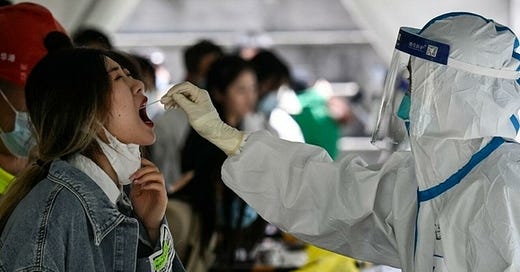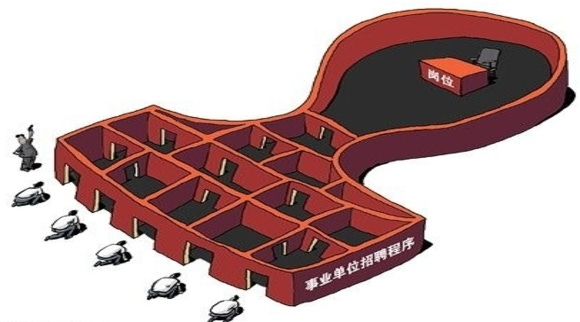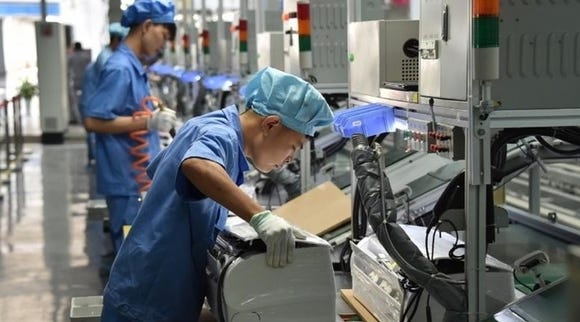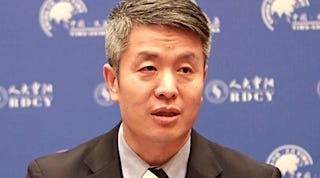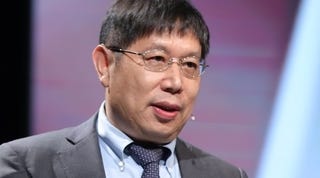Zero COVID cannot be questioned, insists the Politburo—regardless of economic consequences. Facing an ever louder public, the Party threatens repercussions for any voice that 'distorts, questions, or denies' the policy. Zero COVID-19 thus remains Beijing's last word on the subject. On 25 May Li Keqiang addressed some 100,000 state cadres in a teleconference on the economy in a clear effort to take the pressure off them.
Supply chain chaos induced by domestic lockdown and weakening overseas demand is showing up in exports, growing by less than 4 percent y-o-y in April 2022. Growth of imports stagnated as well, yet soaring prices of manufacturing inputs further limit domestic production and dampen consumer confidence.
With COVID weighing so heavily on the economy, more support is on the way. The central bank took a more aggressive stance, lowering both the mortgage rate benchmark and its floor to promote housing demand. More tax and fee cuts are on the way too, with the State Council announcing a new batch of C¥140 bn, bringing the yearly total to C¥2.64 tn. As a follow-up step to Opinions issued January 2022 promoting 'integrated development' of domestic and overseas trade, MofCOM listed pilot regions aimed to help exporters build domestic sales. In a deteriorating global trade climate, the measures aim to expand links between PRC and overseas supply chains.
Despite official comfort, domestic agriculture is in trouble, not least from the poor quality of the winter wheat harvest, delays to spring planting due to pandemic controls, as well as rising production costs primarily due to costly fertiliser. The global food crisis only worsens the problem. New grain export restrictions by a dozen countries forced Beijing to restore trade with conventional suppliers.
Dips in power demand due to lockdowns have not dampened the appetite for coal, with Beijing issuing an additional C¥100 bn in coal re-lending (support from the central to retail banks). New efficiency criteria have been issued to minimise emissions from coal. This is despite the difficulty of reining them in, made clear by news that no new industries will be joining the carbon market in 2022.
Beijing will maintain strong support for the platform economy. The sector however needs a regulatory rethink to become a healthy industry, warns Liu He 刘鹤 State Council vice premier. He notes the importance of state-market relations, opening of the digital economy, and improving basic research and advanced tech.
Making county towns the backbone of yet another urbanisation drive is the burden of joint Party-State Opinions issued in early May. It adds detailed guidance to a 'Notice on key tasks in new urbanisation and urban-rural integrated development in 2022', released in March.
The 14th 5-year plan for public health foreshadows stronger measures on aged care, chronic disease treatment, and maternal and child care. It calls for upgrading public health governance in a post-COVID-19 world, with evidence-based policymaking and overhauling efficiency.
job opportunities
We are currently seeking a lead analyst/analyst for our technology, innovation and energy portfolio. We also welcome internship applications on a rolling basis. If you want to work at the leading edge of policy analysis on China, please join our team! See our careers page or contact hr@policycn.com for information.
lexicon
unpacking current policy-speak and keeping readers up-to-date with policy concepts that are reshaping the debate
counties 县 xiàn
The third level of the PRC’s four administrative divisions (provincial, prefectural, county, township) counties typically contain a county seat or town (a 'county-level' small city, or big town with administrative functions) plus satellite townships. Along with a higher military unit, the commandery (郡 jùn), counties (縣 or 县 xiàn) appear in history from 800 BC. They were for centuries the end-point of state power. A classic saying goes 'imperial power goes no lower than the county' (皇权不下县): the state-appointed magistrate (zhīxiàn 知县) had to rule via self-governed kinship groups or other forces.
The highest de facto authority of a county today is its Party Secretary (中共县委书记). Policies are rolled out by its People's Government, whose head retains the traditional title of xiànzhǎng. The illustration reflects excessive concentration of powers of the Party Secretary, often a delegate of local kinship groups and hence a weakening of imperial-era governance. Waiting for the starting gun are rivals for the top job, only one of whom can win.
featured analysis
Introducing our new 'policy shifts', delivered twice-weekly to clients.
Snapshots of new policy trends—often missed by mainstream media.
SMEs offered compliance over conviction
Prompted by international probes into PRC firms, sweeping corporate compliance reforms are bringing struggling SMEs to heel at home. Since March 2020, the SPP (Supreme People’s Procuratorate) has launched two sets of pilots for grassroots 'corporate compliance'. Setting time frames for firms to rectify issues aims to improve their compliance with international/foreign laws—while avoiding the heavy costs of a criminal trial and verdict. The system borrows heavily from the US Justice Department’s use of compliance agreements. full post open access →
may policy movers
policy professionals in and out of the establishment
Cheng Shi 程实 | ICBC international chief economist
Conventional tactics geared to demand side issues are of little avail against global supply side shocks inflicted by COVID-19. Today is an era of 'low growth, high inflation, high interest rates', with stagflation and long-term falls in total-factor productivity. Global inflation won't be transient: virus variants are still spreading, breaking industrial chains and bringing new global economic uncertainty. Prey to supply chain disruptions, geopolitical conflict and rising trade protectionism, global flows of production factors are being reshaped by new generation IT evolving in three directions: the erosion of vertical divisions of labour, priority accorded to data security, and monopolies by tech and finance giants.
Holding a PhD in economics from Fudan University, Cheng is a prolific author of papers and a dozen or so books on PRC and global macroeconomics and finance. A constant talking head on financial media, he leads a highly-rated investment banking research team at ICBC and is a member of China's Chief Economist Forum.
Zhang Jianping 张建平 | MofCOM Research Institute Regional Economic Cooperation Centre director
Unifying the national market involves both external and internal opening, argues Zhang. For Beijing to align with global norms, direct reform of its domestic market is essential, delivering palpable openness, efficiency and fair competition. The goal is to break down internal circulation chokepoints blocking capital, tech, human and other resources.
As the world's second-largest consumer market, the PRC has vast potential in capital and circulation markets. Realising it calls for markets with unified principles, connected infrastructure and fair regulations. Boosting domestic consumption is a prerequisite, attainable via speeding up income distribution reform, reducing transaction costs and strengthening social safety nets.
Holding a PhD in investment economics from the Chinese Academy of Social Sciences, Zhang serves as deputy general secretary of the Chinese Society of Socioeconomic System Analysis. Frequently commenting on international economics, Zhang has led over 60 research projects in regional cooperation in a global context and Chinese ODI, providing advisory to IOs such as World Bank and the UN.
Wang Sangui 汪三贵 | Renmin University of China Poverty Alleviation Research Institute director
Rural revitalisation is not about 'keeping them down on the farm'. Reflecting on developed countries with rural populations of less than 10 percent of the total, Wang argues modernisation depends instead on getting to large-scale agribusiness with less labour. Rural counties would, he hopes, provide jobs for surplus farm labour. The 2022 No.1 document and supporting measures point, says Wang, to clusters of secondary and tertiary businesses as priorities, led by processing, food manufacturing, rural tourism and rural e-commerce. Rural migrant labour is still needed. But it must be led by urban technical professionals, to attract whom the counties need to overhaul infrastructure and public services.
Specialised in poverty alleviation and rural industrial development, Wang has been a mover and shaker in the anti-poverty campaign. A member of the expert advisory committee of the former State Council Leading Group for Poverty Alleviation, he has been consultant for some other government bodies in China, as well as international agencies like the World Bank.
policy ticker highlights
gems from our feed of policy releases and domestic debate
trade
pilots selected for integrating domestic and foreign trade
Ministry of Commerce | 10 May
context: Following Opinions released by the State Council in January 2022, trade officials have now begun the selection process of pilot cities and zones, designated to advance synergy between domestic and global supply chains under the dual circulation strategy. Coastal regions such as FTZs (foreign trade zones) and SEZs (special economic zones) are likely to serve as the testing ground.
macroeconomy
central bank lowers mortgage rate benchmark
Jiemian (1), Jiemian (2), Jiemian (3) | 20 May
context: Since July last year, real estate sales have experienced negative year-on-year growth for 10 consecutive months. Earlier in May, PBoC reduced mortgage rate floors and this move to drive mortgages down further is a sign that the real estate market is worrying Beijing. Concerns over the impacts of the market downturn on the closely tied land-finance system are also likely at play.
governance
Politburo insists COVID-policy cannot be questioned
Baidu | 5 May
context: Hu Xijin’s article reflects how more and more people both inside and outside decision-making circles believe that relaxing the zero-COVID policy is a choice. However, Beijing still insists the current prevention policy is the only option, or at least having to maintain it ostensibly. Facing increasing pressure from public opinion and the economic slowdown, Beijing relaxed some restrictions to protect the economy but at the same time muzzled people who badmouthed the policy. In addition, Hong Hao 洪灏 BOCOM International chief strategist was muzzled and fired because of his gloomy predictions about China’s future economic performance.
agriculture
China lifts ban on Canadian canola
Weixin, Sina Finance | 19 May
context: In March 2019, the state blocked canola shipments from two leading Canadian exporters, alleging biosecurity concerns. The move was viewed as retaliation for Canada’s arrest of Meng Wanzhou 孟晚舟, Chinese tech giant Huawei’s chief financial officer. With mounting pressure from higher edible oil prices and global supply uncertainties caused by the war in Ukraine, that political gripe has been shelved by Beijing.
energy and environment
new industries no longer joining carbon market in 2022
Weixin | 13 May
context: Accuracy issues for emissions data from thermal-power generation persist, despite the relative simplicity of calculating emissions from the thermal-power generation sector compared to those of China’s other energy-intensive industries. Authorities have therefore turned their attention to improving the accuracy of emissions data before they further expand the national carbon market.
science and innovation
Beijing vows support for platform economy
21st Century Business Herald | 18 May
context: Following the Politburo meetings signalling an easing of the crackdown on big tech and capital, a recent CPPCC meeting further confirms Beijing’s stance on the platform economy: its growth is indeed supported and welcome, but not without a healthy dose of regulation.
society
counties targeted for future urbanisation
Weixin | 11 May
context: Between 2035 and 2050, China’s urbanisation rate will reach 75%-80%, adding about 150-200 million new urban residents. The slowdown of inter-provincial population flows and the return of migrant workers to their hometowns requires that counties develop to absorb this emerging population, meet their residents’ diverse and higher-level development needs, and solve important problems such as housing, employment, schooling and pensions. As a basic unit, the county economy has a unique and distinct existence in China’s regional economy. For a long time, the rapid development of the county economy has eased the pressure on employment and social management in large and medium-sized cities, and as China’s growth model turns inward, the proper handling of county development and construction will affect the spatial pattern of urbanisation and improvement of urban residents’ happiness. While some county seats have developed rapidly, others face various development bottlenecks that cannot be ignored. Some of these challenges include economic recession, weak industrial growth, the brain drain to big cities, chaotic planning and construction, and adaptations to high-quality development.
China Policy is a Beijing-based research and advisory company. Supporting our clients at multiple levels, from in-house research teams to execs and boards, we help them anticipate, understand and respond to China’s changing domestic policy and geopolitical environment. Contact us for more information on our publications and services.

